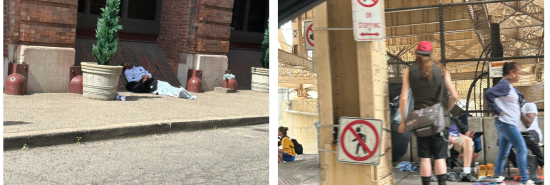
The fall of a great American city: The societal and political decay that has upended Pittsburgh
Salena Zito
Video Embed
PITTSBURGH, Pennsylvania — It’s 10:30 a.m. on a Thursday morning and a homeless man is curled up against the decorative angled brick below the archways of the large pane windows that line the office building known as the Fort Pitt Commons.
For context, it is important to understand that 40 years ago this building was a turn-of-the-century industrial warehouse that was converted into a breathtaking six-story structure with exposed brick, natural beams, an atrium lit by a skylight, and various-sized balconies overlooking all floors.
INFLATION COMPLICATES BIDEN’S PATH BACK TO THE WHITE HOUSE
The structure was so well architecturally regarded the year it opened it won the David L Lawrence Building of the Year for its contribution to Pittsburgh’s Renaissance — and inside still retains the glory and uniqueness that earned that praise.
Outside along the sidewalk however is a different story; on most days more often than not feces and needles litter the sidewalks on either side of the building, and the smell of urine is omnipresent. So are the tents, which line two of the four sides of the building.
Some days the Pittsburgh Renewal truck will pull up to unload a crew to clean up the feces and needles. Today was one of those days; the crew is an effort by Pittsburgh Downtown Partnership, a private nonprofit civic organization formed by local business owners to clean up the city’s decay.
In short, they are treating the symptom of a disease the city refuses to address.
The problem isn’t isolated; it is everywhere in the core of the city. The homeless problem is also far from harmless: Less than two weeks ago, just a couple of blocks from here, Larry Gilmore and his wife Shalawrae had just gotten married and were celebrating their honeymoon at the Even Hotel along Forbes Avenue when the groom was viciously assaulted by a homeless man. The man came at Larry from behind at an elevator, put him in a chokehold, banged his head on the floor, then returned several times to kick and stomp him as he took several items, including his pants.
Court documents show Gilmore was hospitalized with a head injury and was intubated, and listed in critical condition.
Larry Ceisler, a Washington County native who has offices in both Pittsburgh and Philadelphia, was staying at the Even Hotel and came upon the scene moments after the police arrived.

Ceisler said he had just left dinner down the street when he attempted to enter the hotel and found out quickly why he could not immediately do so. He penned a letter to the editor at the Pittsburgh Post Gazette, writing that what he saw happening at the hotel was an extension of a city he saw in decay after spending the week doing business.
“In all my years of living in and visiting Pittsburgh, I have never seen the Downtown look so bad. Empty, dirty, and unsafe. Personally, I experienced an attempted homicide in the lobby of my hotel on Forbes Avenue and was accosted twice walking to my office in Gateway Center,” he wrote.
In an interview with me Thursday, it was clear the respected media pro and prominent Democrat was rattled by the city’s descent, particularly because it was upending its very heart — “A city is only as strong its core.”
A drive throughout the city in mid-morning, mid-afternoon, and in the evening found a city in decay. Homelessness isn’t hidden; it is prevalent. Patches of open-air drug markets are brazenly conducted, the smell of urine and feces is prevalent, and reports of small businesses calling it quits grow in frequency.
Two weeks ago the once acclaimed women’s clothing boutique Peter Lawrence, a hopeful anchor for what city officials hoped would be a women’s shopping district along Wood Street, announced it is closing five years after it opened, with the owner telling the Pittsburgh Post Gazette his workers were “scared to work there a little bit” because of the frequent homelessness and drug trafficking.
The businesses that are not fleeing, yet, are not requiring their workers to come into the city to do their jobs, which has led to a whopping historic high 22.5% vacancy rate, according to a report conducted by real estate firm Jones Lang LaSalle.
At the center of this collapse is Mayor Ed Gainey, who after taking office in January of 2022 has done little to nothing to address the city’s collapse. He is surrounded by people who are so wedded to ideology and the social justice movement that they failed to realize that you actually have to govern to run a city.
Six months ago, the last and only time Gainey addressed Pittsburgh’s slide in front of hundreds of downtown stakeholders, business owners, foundations, and downtown residents, Gainey attempted to use stats to tell everyone in attendance to basically not believe their lying eyes.
As one downtown resident told former deputy mayor and well-regarded Democrat Joe Mistick in frustration after the meeting, “We live here. We’re here every day. We know that’s not true.”
There has been a complete lack of passion coming from Gainey, a gifted orator, on pulling the city stakeholders such as civic leaders, business leaders, foundations, and residents together to solve the problem of the city in the way that was done in 1984 when the city was on its knees economically.
The only passion he has shown has been standing on the picket line with the SEIU, the social justice organization no one including him will deny ensured his victory in November of 2021, or riling people up at campaign events for Sen. John Fetterman (D-PA), Rep. Summer Lee (D-PA), or for abortions rights.
Campaign finance filings show the SEIU spent over $350,000 to elect Gainey, more than all of the other contributors to his campaign combined.
Gainey has steadfastly refused to meet with the largest employer in the city, UPMC, unless they agree to allow the SEIU to represent hospital workers, according to a detailed report done by KDKA investigative reporter Andy Sheehan. It is a curious decision to refuse to meet with the largest employer in the city and makes you wonder if he is the mayor of Pittsburgh or the mayor of SEIU.
As someone who had called Pittsburgh home for the first 60 years of my life, and was a ride-or-die supporter no matter how bad things got in the ’70s, ’80s, and ’90s, to see the city someone in my family has called home since the mid-18th-century take a turn this drastic is nothing less than heartbreaking.
Nearly every day of my life used to include strolls through the city, bikes along the trails, and eating in the city’s wide range of small and unique restaurants. Now, I have not walked through the city alone in over 18 months, and rides along the city’s lovely trails have ended as well. The last time I ate in the city, the walk from the parking garage to the restaurant included so much harassment that I turned around and went home.
CLICK HERE TO READ MORE FROM THE WASHINGTON EXAMINER
Ceisler reinforced what he said in his editorial in that in all of the years of either living in or visiting the city, he has never seen the core so bad, “Even during the rough years in the ’80s the core of the city was never empty with no one walking around, it was also never so dirty and you not only don’t feel safe, you aren’t.”
He doesn’t have the answer, and it appears Gainey isn’t even looking for one. But in political reality he really doesn’t have to, because Pittsburgh is a one-party town, no one challenges him or the city council, and the populace doesn’t either, so it appears the new Pittsburgh status quo will be managing the decay.
